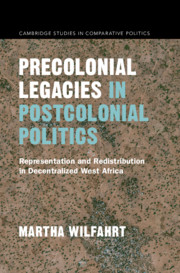 Precolonial Legacies in Postcolonial Politics
Precolonial Legacies in Postcolonial Politics Why are some communities able to come together to improve their collective lot while others are not? This book offers a novel answer to this question by looking at variation in local government performance in decentralized West Africa: local actors are better able to cooperate around basic service delivery when their formal jurisdictional boundaries overlap with informal social institutions, or norms of appropriate comportment in the public sphere demarcated by group boundaries. In this introductory chapter, I lay out the main contours of my theory as well as the implications that the argument holds for key debates in Comparative Politics, including the use of narratives as a lens into actors’ political strategies, the social identities we prioritize in our research, prospects for state-building in sub-Saharan Africa, and our understanding of how historical legacies shape contemporary development outcomes.
To save this book to your Kindle, first ensure [email protected] is added to your Approved Personal Document E-mail List under your Personal Document Settings on the Manage Your Content and Devices page of your Amazon account. Then enter the ‘name’ part of your Kindle email address below. Find out more about saving to your Kindle.
Note you can select to save to either the @free.kindle.com or @kindle.com variations. ‘@free.kindle.com’ emails are free but can only be saved to your device when it is connected to wi-fi. ‘@kindle.com’ emails can be delivered even when you are not connected to wi-fi, but note that service fees apply.
Find out more about the Kindle Personal Document Service.
To save content items to your account, please confirm that you agree to abide by our usage policies. If this is the first time you use this feature, you will be asked to authorise Cambridge Core to connect with your account. Find out more about saving content to Dropbox.
To save content items to your account, please confirm that you agree to abide by our usage policies. If this is the first time you use this feature, you will be asked to authorise Cambridge Core to connect with your account. Find out more about saving content to Google Drive.